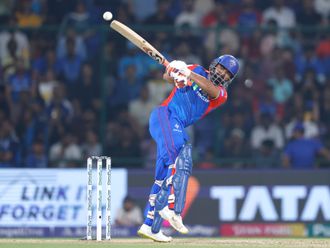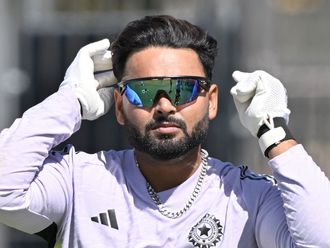
Batting first hasn’t been easy in the ICC Men’s T20 World Cup. Most matches in the UAE have been won by teams that have chased. That’s by batting second. England and Pakistan did win even after batting first. It wasn’t easy, but they figured a way to win.
What’s the problem with batting first? The slowness of the pitch is the problem: the ball comes slowly off the pitch and tends to keep low. Spinners are a threat on such surfaces. With the ball not coming onto the bat, the openers cannot hit through the line, and cross-batted shots result in dismissals. This has been the pattern.
Some teams have managed to solve the pitch riddle when batting first. The tactics have been simple: get the openers to bat through the middle-overs. And even into the slog, if possible. That’s what Jos Buttler did for England, and Mohammad Rizwan did for Pakistan. And their teams were able to post huge scores.
The tactic is not new. Rewind to the Indian Premier League 2021. Ruturaj Gaikwad walked away with the Purple Cap after becoming the highest run-getter in the tournament. His steady start and acceleration in the middle-overs helped Chennai Super Kings win their fourth title.
We see a repeat of that in the T20 World Cup too. The openers are anchoring sides to big totals. Forget the fireworks in the powerplay; the middle-overs are where matches are won. So it’s not unusual to see sub-50 scores in the first 10 overs before teams blaze away in the second 10. By then, the nature of the pitch would have changed; it would have eased a bit. England were 43/3 in the first 10 before they stormed to 163 against Sri Lanka on Monday. And the man responsible for that is Buttler, an opener.
more write clicks
- T20 World Cup: The rise and rise of England, and the fall of Australia
- T20 World Cup in UAE: When a loss is a win for Namibia
- T20 World Cup 2021: Eoin Morgan and the art of captaincy
- T20 World Cup: Quinton de Kock and why taking the knee matters
- T20 World Cup 2021: England and Bangladesh are a study in contrast
It’s not just the openers who have played the sheet anchor role. Even No 3 batsmen have helped similarly. Roston Chase of the West Indies and Rassie van der Dussen of South African rescued their sides with some dour but effective display. The plan has worked even when chasing targets; Van der Dussen and Aiden Markam did just that when steering South Africa to a win over the West Indies.
So, the key to success on the UAE pitches is to keep the wickets in the first 10 overs and attack in the second half. Well then, the onus is on openers.









